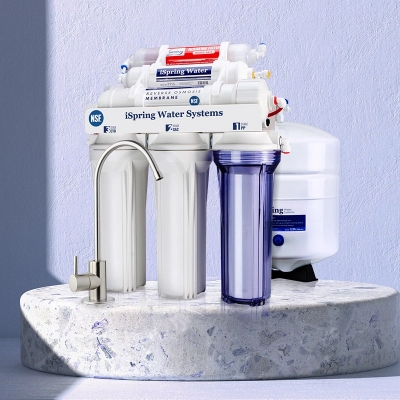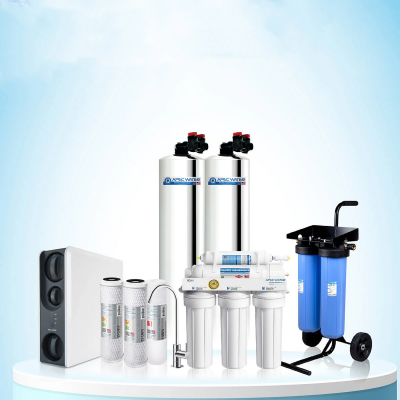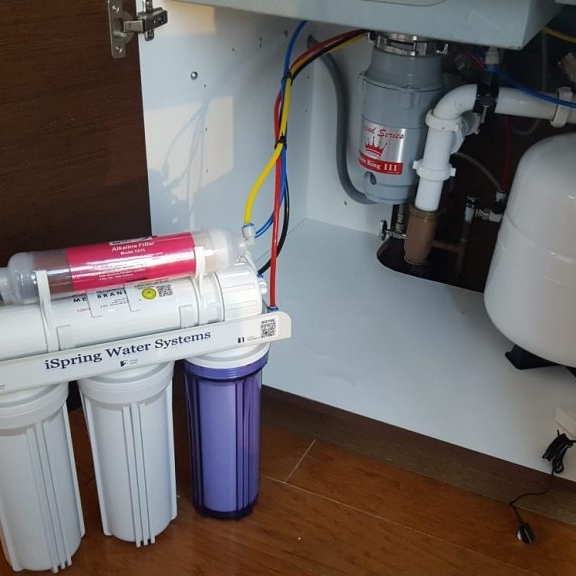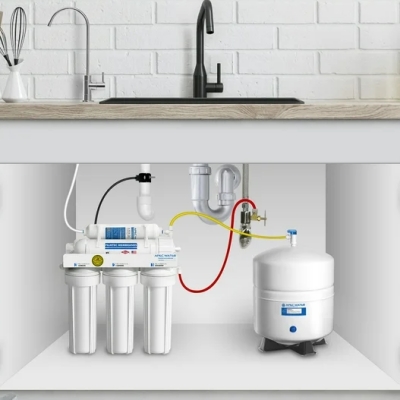What’s the difference between these two top water filtration brands?
With the unfortunate decline in tap water quality across North America, more and more households are turning to water filtration systems for clean, contaminant-free water flowing from every faucet. Two brands – iSpring and APEC – have emerged as leaders in the residential reverse osmosis and water softening market. They create affordable systems utilizing advanced filtration methods to purification water for both drinking and whole home applications.
This in-depth guide will compare iSpring and APEC across five categories to help you determine which brand best fits your household needs:
- Brand Overview & History
- Filtration Technology
- Reverse Osmosis Systems
- Whole House Water Softeners
- Pricing & Customer Service
Whether you’re concerned about lead, chlorine, pharmaceuticals or just want to prevent scale buildup and clogged pipes, iSpring and APEC offer proven solutions. By understanding how these top brands differ, you can make an informed decision to enjoy clean, healthy water. Let’s dive in!
Brand Histories: iSpring vs APEC

iSpring Water Systems
Founded in 2005 in Alpharetta, Georgia, iSpring designs and assembles reverse osmosis systems, water softeners, under sink filters and other water treatment equipment. Their systems are assembled in the USA using globally sourced filtration components. iSpring operates their own FDA-registered and NSF-certified manufacturing facility to maintain quality control. They sell direct to consumers online and through major retailers like Home Depot and Lowes.

APEC Water Systems
Located in City of Industry, California, APEC started in 1997 offering a small selection of RO systems. They now provide a wide range of water filtration and softening systems for both residential and commercial applications. APEC partners with various manufacturers, especially in Asia, to source quality components which they assemble into finished systems in California under their ISO 9001 certified process. They sell primarily direct to consumers.
Both iSpring and APEC have been instrumental in making advanced water filtration technology available to households at reasonable prices. Their made in USA assembly and extensive testing ensures reliable products. They offer similar system choices using comparable filtration methods.
Filtration Technologies: RO, UF, UV & More
To remove impurities found in household water feeds, iSpring and APEC incorporate leading filtration technologies:
Reverse Osmosis – Forces water through a semi-permeable membrane to filter out dissolved solids, heavy metals, bacteria, pharmaceuticals and more. Removes up to 99% of total dissolved solids (TDS).
Activated Carbon – Block or granular carbon filters adsorb chlorine, pesticides, VOCs, odors and organic chemicals through a highly porous surface.
Ultrafiltration – Uses hollow fiber membranes with microscopic pores to trap extremely small particles down to 0.01 microns while allowing healthy minerals through.
UV Sterilization – Destroys microbial contaminants like bacteria and viruses by exposing water to powerful ultraviolet light that damages their DNA.
Water Softeners – Prevent scale buildup from hard water. APEC uses salt-based ion exchange softeners while iSpring offers a no-salt template assisted crystallization model.
Both brands build multi-stage systems incorporating the right technologies to target specific water problems. For example, RO would be used for lead removal while UV tackles microbes and softeners prevent limescale buildup. Combining methods ensures optimal results across a broad range of contaminants.
Reverse Osmosis System Comparison
For purifying drinking and cooking water, reverse osmosis systems from iSpring and APEC are very popular choices. Let’s see how their RO models compare:
- Stages – Most units have 5 or 6 stages using sediment prefiltration, carbon blocks, RO membrane and post carbon filtration. More stages increase contaminant removal. iSpring offers 7-stage RO systems adding UV for microbiological disinfection.
- Installation – Under sink and countertop models are available from both brands. Under sink systems include storage tank and faucet for simplicity. Countertop units connect to your sink faucet.
- Efficiency – Both achieve typical TDS rejection rates of 95% to 99% for clean, mineralized water. The membrane performance is similar across each brand.
- Flow Rate – At 60-100 gallons per day, both produce adequate purified water for most households. Larger systems are available if higher volumes are needed.
- Convenience – iSpring systems include leak detectors, tubing, fittings and drain saddles for quick DIY installation. APEC sells some parts separately but offers solid documentation.
- Warranties – Both provide 1 year limited warranties plus lifetime support. Only iSpring offers an extended 3 or 5 year warranty for parts/labor.
For premium RO filtered water, either brand provides systems that will significantly improve upon tap water quality at an affordable price point. With very similar technologies and capabilities, the choice comes down to price, included components and ease of installation.
Whole House Water Softener & Filter Comparison
Hard water wreaks havoc on plumbing and fixtures by building up limescale over time. To counteract this problem, both companies offer whole house water conditioning options:
Ion Exchange Softeners
- APEC – EcoWaters and HomeDuet series use salt-based ion exchange to remove hardness minerals and prevent scale. Requires regular salt replenishment.
- iSpring – Currently no ion exchange softeners in their lineup.
Alternate Softeners
- iSpring – SPA122 combines template assisted crystallization technology with filtration to condition hard water without any salt, chemicals or electricity.
- APEC – No salt-free softener systems offered. Some systems include acid neutralizing filters.
Whole House Sediment Filters
- iSpring – RC4120 high flow 4.5″ ports filter removes sediment down to 1 micron for whole home protection.
- APEC – Several sediment filter choices available, but smaller 2.5″ ports limit flow rate. Designed for pre-filtration.
While APEC has a strong offering of traditional salt-based softeners, iSpring takes an innovative approach with their salt-free and whole house sediment solutions. Customers seeking an alternative to salt softeners while still protecting their plumbing can benefit from iSpring’s unique offerings in this category.
Pricing & Support: Which Brand Comes Out Ahead?
Pricing and customer service should also factor into any iSpring vs APEC buying decision:
- System Pricing – At a given configuration, iSpring systems are typically 15-30% less expensive than comparable APEC models. More bang for your buck!
- Replacement Filters – Both brands offer filters and membrane replacements at reasonable prices, though APEC membrane costs are higher.
- Technical Support – APEC provides good documentation but very limited phone/email support. iSpring offers better direct support options including phone, email and live chat.
- Warranty – As mentioned previously, iSpring provides an industry leading 1 year limited warranty plus the option to purchase 3 or 5 year extended warranties covering parts and labor. APEC just offers 1 year limited.
When it comes to what you pay upfront and ongoing maintenance costs, iSpring delivers excellent value at very fair pricing. And their stellar technical support resources get high marks from customers.
Choosing the Right System For Your Home
When comparing iSpring and APEC water filtration systems, both deliver effective solutions using proven technologies to protect your household water supply and plumbing. A few key factors may help you decide which brand is right for your home:
Consider iSpring For:
- Innovative salt-free water softener options
- Under sink RO systems with UV sterilization
- Lower upfront and operating costs
- Extended part/labor warranties up to 5 years
- Superior U.S. based customer service

Consider APEC For:
- Longstanding industry player with reputation for quality
- Broad range of traditional water softeners
- High performance countertop RO systems
- Commercial and higher volume systems
- Good documentation and manuals

At the end of the day, you can be confident choosing systems from either brand. Both iSpring and APEC make high quality water filtration and softening systems incorporating the latest technology to effectively remove common tap water contaminants. Pick the combination of features fitting your budget and requirements. With regular maintenance, these systems will deliver clean, healthier water to your family for many years.
